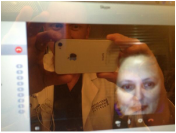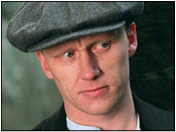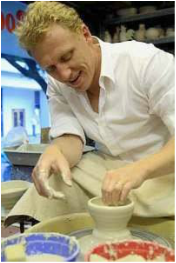Now, after more than showing he knows how to handle a broadsword as god-worshiping characters in Rome and The Last Legion, McKidd finally ascends to the all-powerful heavens with Percy Jackson & the Olympians: The Lightning Thief, essaying the role of Poseidon alongside an acting pantheon that includes Sean Benn’s Zeus, Rosario Dawson’s Chiron and Uma Thurman’s Medusa. It’s McKidd’s charisma that unleashes the thunder like never before (not to mention the ocean) in his relationship to a half-god son whom he seeks to protect from the various demons and deities that want his birthright. But perhaps even cooler for McKidd than going to Mount Olympus is being on the ground floor of what might be the next big Hollywood teen-fantasy franchise, one directed by no less than Harry Potter’s Chris Columbus. For fans of Kevin McKidd’s work, not to mention the acting aspirations of his countrymen, Percy Jackson is a literal godsend.
click "read more" to read the Interview
Kevin McKidd: Poseidon definitely gets prominence in this movie because he’s Percy Jackson’s father. That gives him a good head-start! Percy finds out he’s a half-blood son of a god and is a demi-god himself. He’s an unhappy teenager with a stepfather he hates, and then finds out that he’s got these powers from his dad. So what’s beyond the big fantasy-action of the movie is the story of an estranged father and son, almost as if Poseidon had been a divorced dad who didn’t get custody. That’s because Zeus passed an edict forbidding all gods from meeting and talking with their half-god children. So Percy Jackson is kind of like Kramer Vs. Kramer in a way! And Zeus is the judge of this court.
DS: Movies always seem to cast actors from the British Isles as the gods, from Laurence Olivier as Zeus in the original Clash of the Titans to Liam Neeson and Ralph Fiennes in the remake. Why do you think Hollywood likes those all-powerful English accents?
KM: I think it’s a cinematic shorthand, probably stemming back to the days of the theater because, when you think of the perceived knowledge of the gods, an English accent conveys it in a classical environment. That’s the only hunch I can go on.
DS: When you’re doing a major effects franchise movie like this, how difficult is it to get to the emotional truth of a character like Poseidon?
KM: I think the job, in movies like this, is to let all those effects happen and try to hold onto the job you always do as an actor, which is to delineate the small, human moments. Our director, Chris Columbus, is great with actors and characters. He wants to keep us all human and connected. And being in a background like this before with Rome certainly helped.
DS: How did you become part of The Olympians?
KM: As an actor, it’s always flattering when a director asks for you to be in a film because they’ve seen your work, and that’s what happened in this case, with Chris liking my work in Rome and Journeyman. So whether it’s a franchise movie or a small independent picture, you’re just honored to be in the project because they want you there. The fact that this is the start of a big franchise is definitely something new to me, and I’m excited about that because I’ve never done anything like this before. Yet, at the end of the day, I became an actor to do different stuff with my life. It’s been a happy, fun experience so far, especially on Percy Jackson.
DS: For me, Rome was one of the best television series of the last decade. You keep hearing rumblings that they’re going to do a movie version of it. Do you think that could really happen?
KM: It definitely could. The show’s creator, Bruno Heller, and its producer, Anne Thomopoulos, loved the idea of how these lowly Roman soldiers mess with history, so they’re very much gung-ho to make it happen this summer. So keep your fingers crossed because things are very hard in the movie business. It’s all about finding the right backing, but there’s definitely an intention and a script. They key thing is the desire of the cast — those whose characters aren’t dead yet — to go back to it. We’re all very excited about the idea because these characters are so vibrant that they deserve another outing.
DS: Next to Maximus at the end of Gladiator, your Lucius Vorenus probably will have the most difficult time reasoning how he could have survived for a sequel.
KM: I remember how we shot the scene where I’m on my deathbed and reconciling things with my daughter. We played the scene and I closed my eyes with the idea that we fade to black. But there was a lot of talking on the set, and I’m lying there with white makeup on my face. Then our producer, John Melfi, comes up to me and says, “Okay, let’s do one more take, but this time, don’t close your eyes,” and that’s what ended up on the show, with the scene fading to white. So when Lucious’s friend Titus says that he didn’t make it, he’s, in fact, covering for him because the idea is he and Vorenus have disappeared into the Rhineland in Germany, where they’re living in a mud hut until things cool off. And that’s where the movie picks up.
DS: Your film debut was in Trainspotting, where you played the “gentle giant” Tommy. With a film so full of manic, drugged-up energy, was it the same way on the set? KM: It’s so long ago now that the one distinct memory of Trainspotting that I have is of this stunningly beautiful woman hanging around the set. This was an ultra low-budget movie. We had no trailers and no facilities. Nothing. Just a fold-away table! I remember us standing in the Scottish highlands of Edenborough, shooting that opening sequence and I’m thinking, “Who is this amazingly beautiful woman? She looks like a movie star!” And it was Johnny Lee Miller’s then-girlfriend Angelina Jolie! That was kind of weird. It’s an interesting moment to look back on when you think of how Angelina started to become the movie star she’d be a few years later.
DS: Right after Trainspotting, you appeared as a gang member in an excellent Scottish ’60s period crime film called Small Faces.
KM: I was Malky Johnson, the leader of The Tongs. Everyone thinks Trainspotting was my first movie, but actually Small Faces was. In the middle of shooting, Danny Boyle showed up in Glasgow trying to cast the part of Tommy. That was the only vacancy among the male leads, and every actor in Scotland was trying to get the part. So Danny asked our director, Gilles MacKinnon, if he could watch the dailies to see some of the up-and-coming actors on the film. Danny asked to meet me, and I went in and read for it. It was as simple as that. It was one of those lucky moments. Small Faces ended up being a very underrated film. It came out a month after Trainspotting and was overshadowed by it. That’s a shame because I think it was a great period piece.
DS: You’d later return to the land of Trainspotting with the Irvin Welsh-scripted The Acid House, which was almost as much twisted fun.
KM: I was in the middle of its trilogy with a story called The Soft Touch, playing a guy who worked at a supermarket who ends up in a bad marriage. It was pretty harrowing stuff. I was very conscious of how similar The Acid House was to Trainspotting, which made it good I was in a sequence that wasn’t fantasy-based like the rest of the segments. The Soft Touch was very grim, almost Ken Loach in style — dark, foreboding and urban — and that made me feel that I wasn’t repeating itself.
DS: You really got put on the genre map with Dog Soldiers as the private who ends up surviving the werewolf onslaught.
KM: I’m Cooper, who’s the underdog who does well. It was Neil Marshall’s first film as a writer and director, and at first, I didn’t get it. But after speaking with Neil, I realized how much he wanted me to do it, and I knew this would be something special. We shot the film in Luxembourg and played it absolutely straight, which was what made Dog Soldiers so funny. Now people come up to me and say that not only is Dog Soldiers one of their favorite werewolf movies but one of their favorite genre films. In fact, it was always going to be a trilogy, with Cooper fighting zombies in the second movie and then fighting himself (his doppelganger) in the third, yet we never quite got around to that. As it happens, I spoke to Neil today, and now that we have more leverage in the industry, we want to do another genre film together.
DS: You could be the British version of Ash from the Evil Dead films!
KM: Right! [Laughs]
DS: A particularly underrated film you were in was Hannibal Rising, where you played a sympathetic bad guy…
KM: Who happened to be a sympathetic cannibal! Usually, characters like Kolnas build toward their horrific instance, which, in this case, is killing Hannibal’s young sister. You find Kolnas at the beginning of the second World War doing terrible, dehumanized, desensitized things, which kind of foreshadowed what’s happened recently in war situations. Years later, Kolnas has a family, runs a restaurant, and is trying to put it all behind him. He’s very suburban in his life, and then his past comes back to haunt him in the form of Hannibal, who’s seeking revenge. But Kolnas has been trying to be a better person since that time, and that was quite an interesting and dark situation to play.
DS: Though Rome was a cable success, you really got your first major network exposure as the star of NBC’s Journeyman. Why do you think the show got such a following, even with only one season?
KM: Rome got such good critical notices that, once it was finished, all the networks started looking at the actors who were now free. So I met a lot of neat and talented people all of a sudden, which had never happen to me before like this, and two of those people were Kevin Falls and Alex Graves. I was already a big fan of their work on The West Wing, and I loved their pilot script for Journeyman. It just seemed to be a right fit for me because there were brains behind this operation and a sensibility that I liked. Sure, the pressure was great on me as the lead on it, but I’d also come through the same thing on Rome, and when you’re part of the creation of a show, it’s a very stressful period because you’re giving birth to this baby with loads of arms and legs. That sounds horrific! But then it is horrific! I think Journeyman ended up doing well creatively because it was intelligent TV. Some people may have said it was too clever, but I’m proud of making a show that, within the confines of a one-hour network drama, tried to do something that made viewers exercise their brains. It was well-executed and the cast was terrific.
DS: What do you think would have happened to Dan on Journeyman?
KM: I really don’t know, but the writing-room was really starting to kick it up a notch when we were told it was over, so I think Dan would have gone to some very cool places.
DS: I recently died in your company several times while playing “Modern Warfare 2.”
KM: I apologize.
DS: What was it like to create a convincing character as “Soap” MacTavish for one of the biggest video games yet created?
KM: Doing “Modern Warfare 2″ was like restoring the great tradition of radio plays, which I think have died here in America. I’d done radio plays with actors like Derek Jacobi, who’d pop into the BBC studios in London to do “Hedda Gabler” for the radio. Shows like that are still very much a part of British culture. “Modern Warfare 2″ was like a radio play, in a way. It’s ten hours worth of recording to do every line of that character, which is quite tough on you physically because a lot of it is screaming at the top of your voice. It’s also an acting exercise when you get a line of text and you have to commit to it without having any idea of what’s happening around your character. I actually just got the game, so I think I’ll sneak into my kid’s room when he’s asleep and play it on his Xbox!
DS: You’ll be “Killer #2” in Bunraku. What’s a movie with a title like that about?
KM: It’ll be a very interesting film. Guy Moshe, who also directed, wrote what I thought was one of the strangest scripts I’d ever read, especially because the story takes place in an in-depth CGI universe. It’s very allegorical — a mixture of a samurai film and a western in a virtual origami universe where everything is made of folding paper, and there’s a lot of martial arts in it. My first reaction was like when I read Dog Soldiers. Once again, everyone told me I was crazy if I made this film, yet I thought Bunraku was interesting enough to be in. I play the main killer of the movie who’s hunting down Josh Hartnett’s character under the instruction of Ron Perlman’s character, Nicola. They’ve been doing the effects for the last 19 months. But then this is an independent film, not Avatar. I’m really excited to see Bunraku.
DS: What’s ahead for Doctor Owen Hunt on the new season of Grey’s Anatomy that you’re shooting right now? KM: What’s great about a long-running television show like that is getting to really explore the different areas of your character. I think Owen is going to keep developing. He had a bad time when he first came to the hospital because he was suffering from post-traumatic stress disorder. Hopefully we’ll see a lighter side to his character. Now I’m hoping to see more of his lighter side.
DS: You’re as capable of showing your romantic side in Grey’s Anatomy and Made of Honor as displaying a tough physicality in Rome and Percy Jackson and the Olympians. In the end, what image do you want to project in Hollywood?
KM: Maybe it’s a mistake, but I’ve never liked painting myself into a corner and saying, “This is what I play.” I like changing things up. I always have. And maybe that means you’re not as sell-able as you might be if you just decide on one track, but for better or worse, I’ve always wanted to be perceived as an actor who does diverse roles. In any case, I’d certainly love to play more Scottish characters.
DS: When you play a real historical character, there’s certainly the need to do his legacy justice. But when you play a mythological god like Poseidon in Percy Jackson, do you feel you have to live up to a character, in a way, that’s bigger than life?
KM: I’m 40 feet tall in my first shot for the movie, so you literally have to live up to a larger-than-life character like that. You have to elevate yourself to God status!
DS: It’s only too bad that this Poseidon doesn’t get to say, “Unleash the Kraken!”
KM: Maybe for Percy Jackson 2!
Source







